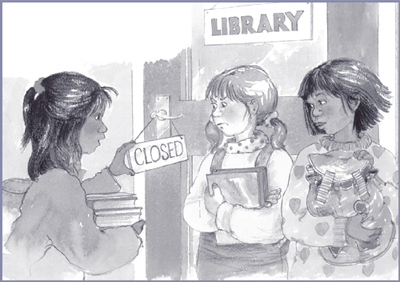| Approach: Station |
|
|
| Focus:
Friendship.
|
| Resources:
Illustration
in task book. |
|
|
| Questions/instructions:
Imagine
that you have this problem:
The person you want to have as your best friend doesn’t want
you as a best friend. You are very unhappy about this.
Me whakaaro noa:
Kei te pïrangi whakahoahoa koe ki tëtahi, engari, käre
ia i te pïrangi ki a koe. Nä, ka päpouri koe.
|
 |
|
|
%
responses
|
| Ged |
MI |
1.
Write down the ways that you might deal with this problem.
Me ahatia e koe? Tuhia.
|
|
|
Ways
to deal with problem:
|
accept
person does not want to be your friend
(get over it) |
26 |
8 |
decide
to ignore person |
9 |
5 |
talk
to friend, try to find out what is wrong |
37 |
32 |
get
help/advice from someone else |
8 |
3 |
change
behaviour to suit friend |
7 |
0 |
try
to change friend’s views |
17 |
0 |
negotiate
compromise |
5 |
0 |
find
new best friend |
45 |
54 |
How
well has the problem been addressed?
|
very
well |
2 |
0 |
well
|
29 |
8 |
moderately
well |
52 |
78 |
poorly
|
17 |
14 |
2.
Who are some people who might be able to help you with this problem?
Ko wai ëtahi tangata
ka taea e rätou te äwhina i a koe?
3. Draw a ring around the person in answer 2 who you think would be the
most helpful.
I tö whakautu tuarua,
porohitatia te tino tangata hei äwhina i a koe.
4. Why do you think this person would be the most helpful?
He aha koe i whakaaro ai
ko tënei te tino tangata?
|
|
|
Most
helpful person:
|
parents/whanau
|
37 |
49 |
siblings
|
3 |
0 |
teacher/principal
|
8 |
21 |
health
professional |
5 |
3 |
friends/peers
|
42 |
24 |
other
adults |
1 |
0 |
other/none
|
4 |
4 |
Explanation:
|
strong
|
20 |
19 |
moderate
|
66 |
65 |
weak
|
14 |
16 |
| |
Total
score:
|
5
|
1 |
0 |
4
|
6 |
3 |
3
|
33 |
19 |
2
|
41 |
54 |
1
|
14 |
21 |
0
|
5 |
3 |
Commentary
The results achieved by Mäori students in general education (GEd)
settings and students in Mäori immersion (MI) settings were not statistically
significantly different. |